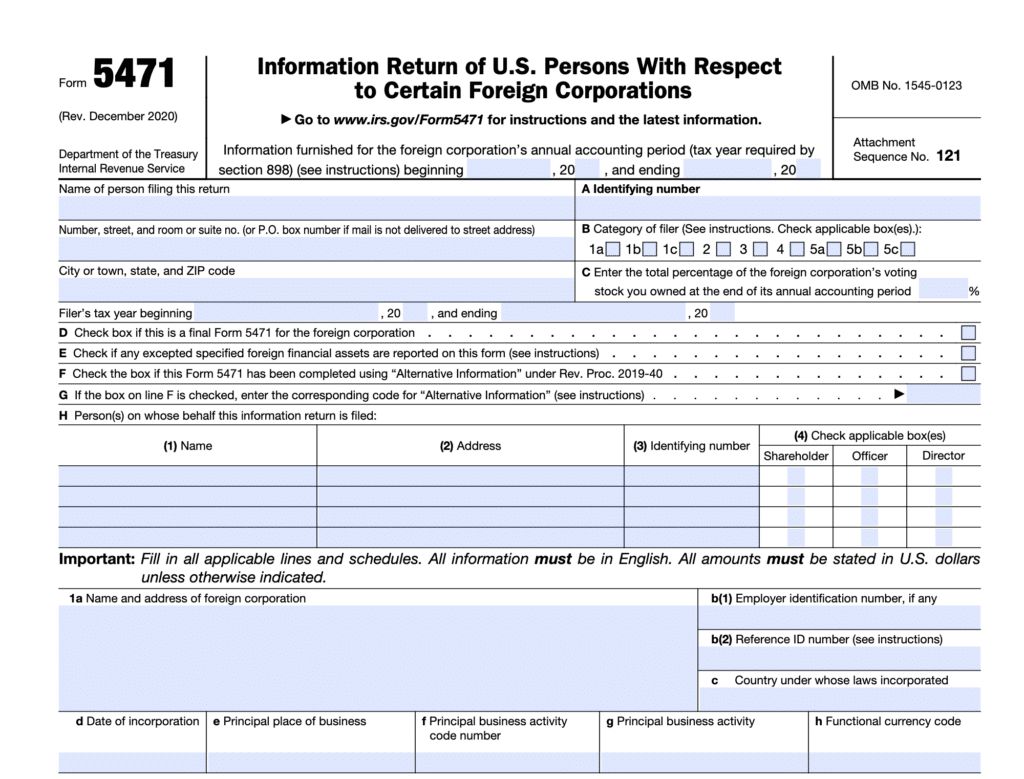
What is a Form 5471?

IRS form 5471 is a form issued by the Internal Revenue Service (IRS). Form 5471 – Information Return of U.S. Persons With Respect to Certain Foreign Corporations must be completed and filed by certain taxpayers to report ownership of a foreign corporation.
Who Must File Form 5471 and When?
There are five categories[1] of people or entities who must file a Form 5471. Form 5471 must be attached to and filed with your personal, partnership, or other entity’s income tax return. As such, the filing deadline is the same as that of the income tax return.
Category 1 Filers
After the tax year ending December 31, 2017, a Category 1 filer is a U.S. shareholder who is a U.S. person who owns at least 10% of the voting power or value of all classes of stock of a Specified Foreign Corporation (SFC). Before that date, a Category 1 filer is a U.S. shareholder who is a U.S. person who owns at least 10% of the voting power of all stock classes of an SFC. For purposes of this section an SFC is a Controlled Foreign Corporation (CFC) (see below), or a foreign corporation where at least one domestic corporation is a U.S. shareholder. However, there are exceptions for a passive foreign investment company.
Category 2 Filers
A filer matches this category when there is a U.S. resident or citizen who is also a director or an officer of a foreign corporation, and that U.S. person has acquired more than 10% stock ownership as required by this section or at least 10% of the stock either for voting power or value. For purposes of this category, stock is considered acquired when a person has a right to the stock, whether or not the stock has been issued.
A U.S. person for this category can be a citizen or resident of the U.S.; a domestic partnership; a domestic corporation; and certain foreign estate or trusts.
Category 3 Filers
This category includes U.S. persons as defined in category two. And, that person owns at least 10% of the foreign corporation, or at one time acquires at least 10%, or the owned amount was reduced to below 10%, or a person who becomes a U.S. person while owning 10% or more stock ownership of the foreign corporation.
Category 4 Filers
A U.S. person in this category is the same at in Category 2, but also certain nonresident aliens; and nonresident aliens who become citizens or residents during the tax year and are married at the close of that tax year to a citizen of resident of the U.S.
[1] ***Note: For information concerning subcategories not mentioned in this blog, contact one of our qualified attorneys to determine your applicable category.
During the annual accounting if a U.S. person has control of a foreign corporation of at least: 50% of the total combined voting power or total value of shares in the foreign corporation. This can also apply to certain corporations. For example, if a U.S. person owns at least 50% of the voting power or stock and that corporation owns at least 50% of the voting power or stock of a foreign corporation then that corporation fits in this category.
Category 5 – The Common Filer
The most common filer is a U.S. citizen who holds an interest in a Controlled Foreign Corporation (CFC) either directly, indirectly, or constructively. A CFC is a type of foreign corporation in which U.S. shareholders own, on any day of the tax year, over 50% of the stock or voting power in the CFC entity.
On an individual basis, if you are a U.S. citizen with ownership of 10% or more of the CFC’s stock or have 10% or more of the CFC’s voting power, you must file a Form 5471 with your annual income tax return.
To illustrate further,
Example 1: If a U.S. citizen (or entity) owns 25% of a foreign company and their offspring owns an additional 25% of the same foreign company, the company will be considered a CFC under the constructive ownership of stock rules.
Example 2: If a U.S. citizen (or entity) owns 30% of the shares with voting power in a foreign company and a different U.S. citizen (or entity) owns an additional 30% of the shares with voting power of the same foreign company, that foreign company will be considered a CFC because the total of U.S. shareholders collectively own 50% or more of the total voting power
Please note that for purpose of a determining the status of a CFC, a U.S. person is: (i) a citizens or resident of the U.S.; (ii) a U.S. domestic partnership; (iii) a U.S. domestic corporation; and/or (iv) a non-foreign estate or trust.
Is there a Penalty for Failure to Report?
Yes! There is a $10,000 penalty imposed on each accounting period and for each foreign corporation for which you fail to report as required. The IRS will usually grant a 90-day grace period in which you can file your Form 5471 after the IRS has issued a failure to file notice. After that 90-day period has passed, there may be additional $10,000 penalties for each 30-day period (or shorter) for which the return remains unfiled, up to a maximum of $50,000.
In addition, a person or entity that fails to report or file, may be subject to a 10% reduction of foreign tax credits available under certain sections of the U.S. Tax Code. After the 90-days grace period, the IRS may impose an additional 5% reduction in those available tax credits for each 3-month period, or shorter, in which the delinquency is not corrected. Furthermore, under certain circumstance, criminal prosecution and penalties may apply.
Did You Not Properly File or Report?
It is common for individuals who did not file, or report Form 5741 properly to also have issues with failing to report other required information both to the IRS and US Treasury. If you did not properly file or report Form 5741, you should consult with a qualified attorney.
Questions
Form 5471 can be difficult report to properly compile and file. RLS LAW and its qualified attorneys are available to assist in preparing and reporting your Form 5741 as well as with other reporting or filing issues and delinquencies. Please call RJS Law for a free consultation and assessment at 619-595-1655. You may also contact us via the web at www.RJSLawFirm.com. We look forward to hearing from you.
About Us
Published by Andrea Cisneros Valdez, Esq. and Andrew Rice, Law Clerk

Leave a Reply